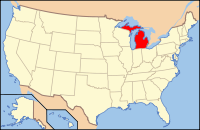Sanilac County, Michigan
| Sanilac County, Michigan | ||
|---|---|---|
|
||
 Location in the U.S. state of Michigan |
||
 Michigan's location in the U.S. |
||
| Founded | September 10, 1822 (created) 1848 (organized) |
|
| Seat | Sandusky | |
| Largest city | Sandusky | |
| Area | ||
| • Total | 1,590 sq mi (4,118 km2) | |
| • Land | 963 sq mi (2,494 km2) | |
| • Water | 627 sq mi (1,624 km2), 39% | |
| Population | ||
| • (2010) | 43,114 | |
| • Density | 45/sq mi (17/km²) | |
| Congressional district | 10th | |
| Time zone | Eastern: UTC-5/-4 | |
| Website | www |
|
Sanilac County is a county located in the U.S. state of Michigan. As of the 2010 census, the population was 43,114. The county seat is Sandusky. The county, which is part of the Thumb region, was created on September 10, 1822, and was fully organized in 1848.
Sanilac County is considered to be part of the Thumb of Michigan, which in turn is a subregion of the Flint/Tri-Cities. Sanilac County enjoys seasonal tourism in towns such as Lexington, Port Sanilac, and Carsonville. Sanilac County is economically attached to St. Clair County and Huron County and has very fertile, flat land.
Sanilac County was probably named for a Wyandot (Huron) chief named Sanilac. (See List of Michigan county name etymologies). The county was formed on September 10, 1822, by Michigan Territory from part of St. Clair County and unorganized territory administered by Oakland County. It lost land to the creation of Huron and Tuscola counties in 1840. The county government was fully organized on December 31, 1849.
In the middle of the 19th century, the area now called Port Sanilac was called Bark Shanty. It was named for a lone shanty made of bark, which was used to make shingles from pine. The Algonquin word "zngwak" means pine. The county seat of Sanilac is the city of Sandusky.
...
Wikipedia

